Thurston County presents updated on-site sewage management plan; public hearing to be scheduled in December
Get AI-powered insights, summaries, and transcripts
Subscribe
Summary
Environmental Health presented the 2025 update to Thurston County's on-site sewage (septic) management plan, including recommendations on septic-to-sewer planning, marine recovery areas, databases, and funding; the board approved scheduling a public hearing during the December Board of Health meeting.
Thurston County Environmental Health presented an updated on-site sewage system management plan on Oct. 14, outlining recommendations to improve septic system oversight, prioritize sensitive waterways and pursue sustainable funding. The Board of Health voted to schedule a public hearing on the plan during the December board meeting.
Jean Frost, senior environmental health specialist, summarized the plan update process, noting state regulatory changes require local plans to be developed or updated by April 1, 2027. Frost said the 2025 update builds on prior plans (2008 and 2016), analyzes septic performance data, and reflects input from stakeholders and consultants.
Frost identified six recommendation categories: septic-to-sewer planning to increase collaboration and affordability; designation of additional marine recovery or sensitive areas (the county currently has two: Henderson Inlet and Nisqually Reach); creation of databases and dashboards tied to a new permitting system; climate-change planning to assess sea-level rise and other risks; establishment of quality-assurance metrics for inspections; and expansion of county-led septic programs such as time-of-transfer requirements, riser rebates and small grants.
She singled out water bodies recommended for heightened protection, listing Eld Inlet, Budd Inlet, the Deschutes River watershed and Summit Lake (noting Summit Lake's potable water importance and history of harmful algal blooms). Frost told the board the county seeks to increase notification and oversight for approximately 40,000 septic systems outside current operational-certificate programs and project grant areas over the next five years.
Outreach and next steps: Environmental Health worked with consultant Green Economics, presented recommendations to local shellfish protection districts, published social media posts and emailed 1,262 certified septic professionals and related stakeholders; staff will present the draft at the county's septic professional summit on Nov. 6 and are requesting the board schedule the December public hearing. Frost said the county has already received public comment from one septic professional and inquiries from the city of Tumwater and other jurisdictions.
Board action: Commissioner McKeown moved and Commissioner Clough seconded a motion to schedule a public hearing during the December Board of Health meeting; the board voted in favor with no recorded opposition.
Why it matters: The plan update is required under recent state rule changes and sets a multi-year strategy to protect water quality, prioritize sensitive areas for shellfish and recreation, and create better data and funding mechanisms for septic system maintenance and replacement.
Next steps: The board will hold a public hearing in December, then staff will pursue phased implementation over the next five years including funding options, prioritization of marine recovery areas, and database deployment. No ordinance or funding appropriation was made at the Oct. 14 meeting.
